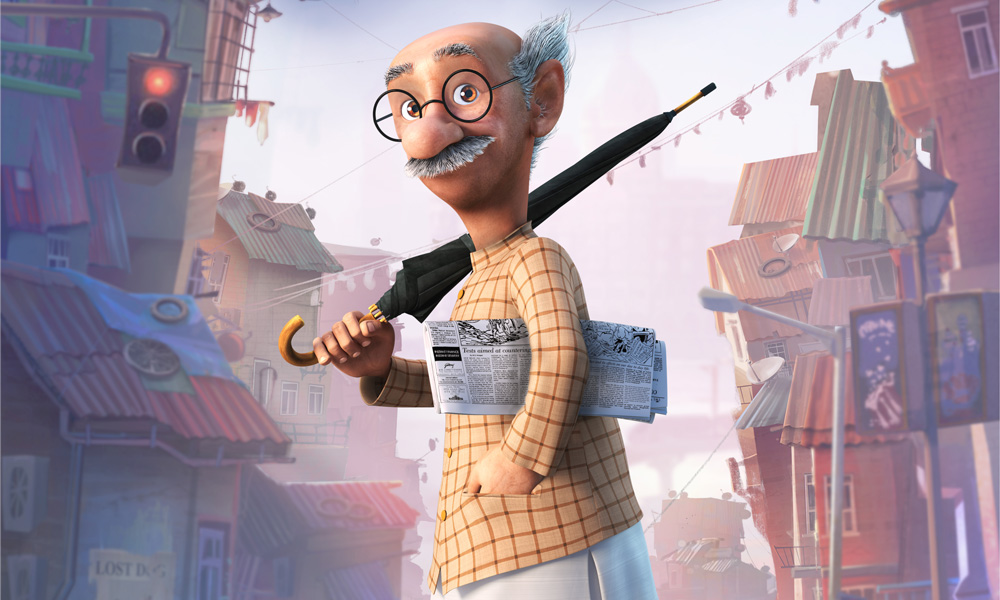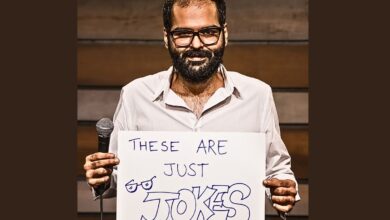Kunal Kamra Row: Are Jokes Illegal In ‘Democratic’ India?

In a land where ancient texts speak of Hasya Rasa (the emotion of laughter) as one of the nine essential emotional experiences of human existence, we find ourselves in the peculiar position of watching comedians face legal consequences for making people laugh.
Yes, dear reader, it appears that JOKES ARE ILLEGAL IN INDIA—at least the ones that make powerful people uncomfortable.
The latest update in this curious war against humour is stand-up comedian Kunal Kamra, who now faces multiple police cases for alleged remarks about Maharashtra Deputy Chief Minister Eknath Shinde. The complaints were registered by a diverse coalition of the offended: the Mayor of Jalgaon city, a Nashik-based hotelier, and a businessman—a veritable trinity of humorlessness.
What grievous crime did Kunal Kamra commit to attract such attention from the authorities?
He created a comedy special called “Naya Bharat” (New India) where he committed the unforgivable sin of pointing out things that millions of Indians experience daily. He spoke about customers being cheated by electric vehicle companies, the seemingly eternal metro construction projects that turn cities into obstacle courses, corporate employees paying more taxes than the corporations themselves, Delhi’s air quality that has graduated from merely unhealthy to actively homicidal, and the masterful distractions employed by those in power to keep citizens from noticing these inconveniences. In short, he held up a mirror to society—and apparently, some people didn’t like their reflection.
The response to this comedic transgression was swift and proportional: henchmen allegedly destroyed the studio where the video was shot. Because nothing says “we respect democracy” quite like physically demolishing the stage where words you dislike were spoken. It’s reminiscent of book burnings, except with more property damage and less subtlety. Today it’s Kunal Kamra, yesterday it was Ranveer Allahabadia, tomorrow it will be another artist who dares to suggest that perhaps all is not perfect in our paradise.

But we shouldn’t be surprised. Throughout history, those who dare to use humour as a weapon against the rich and mighty have often found themselves in potholes. In medieval Europe, court jesters were often the only ones who could criticize kings without losing their heads—though this privilege came with strict boundaries. The 16th-century jester Will Sommers could joke about Henry VIII’s notorious marital habits, but only because he wrapped his criticisms in enough flattery to make them palatable. When the balance tipped too far toward truth and away from amusement, jesters often found themselves unemployed or worse.
In Akbar’s court, the renowned Birbal employed humor to ask tough realities to the emperor, cleverly wrapping criticism in riddles and fables. The Sufi poet Kabir wrote dohas that criticized religious hypocrisy and societal inequity while passing them off as spiritual truths. The tradition of veiled criticism continued through colonial times, with writers like Premchand and Saadat Hasan Manto using fiction to highlight the brutalities of both foreign rule and indigenous social practices.
Modern India inherited this rich tradition of using humour as social commentary. Filmmakers like Hrishikesh Mukherjee created masterpieces like “Gol Maal” and “Chupke Chupke” that gently lampooned social pretensions. Cartoonists like R.K. Laxman commented on political absurdities through his “Common Man” cartoons for decades without facing FIRs or vandalism. Writers like Harishankar Parsai wrote satirical essays that skewered political hypocrisy throughout the 1960s and 70s. What changed? Did we collectively lose our sense of humour, or did power become more fragile, more easily threatened by punchlines?

Mark Twain once said, “Censorship is telling a man he can’t have a steak just because a baby can’t chew it.” This brilliant quote reminds us that solutions should uplift society, not limit everyone to the lowest common denominator of tolerance. Yet here we are, in 2025, with an expanding creator economy boasting over 4 million influencers, simultaneously watching the space for free expression contract like a dying star.
The current landscape for Indian comedians, filmmakers, and content creators resembles a high-wire act performed without a safety net. One misplaced word, one joke that lands awkwardly, and they face a barrage of FIRs, show cancellations, or the modern equivalent of public flogging: trial by social media. The unstated rules are as clear as Mumbai’s air during monsoon: some topics are untouchable, some figures beyond questioning, and some sacred cows too sacred to even acknowledge exist.
But let’s be honest about what censorship actually means?
- It doesn’t protect society, rather it infantilizes it.
- It doesn’t preserve harmony, but it enforces silence.
- It doesn’t promote respect, however, it mandates fear.
Not only do we lose laughs when we criminalize humor and suppress criticism, but we also lose the fundamental processes that societies have used historically to deal with tough realities. We lose perspective, creativity, and the difficult but essential dialogues that propel advancement.
The irony is palpable. In ancient India, philosophical debates were so valued that kings would host shastrartha—formal argumentative sessions where opposing viewpoints could be expressed without fear of reprisal. The Buddha encouraged questioning established doctrines, including his own teachings. The Nyaya school of philosophy centred on the logical debate as a path to truth. Yet, in modern India, a comedian can’t joke about potholes without risking legal action.
Lets see historical parallels that sync with today’s situation.
When Charlie Chaplin released “The Great Dictator” in 1940, he used humour to mock Hitler and Mussolini at a time when many were still hesitant to criticize them openly. In addition to making people laugh, his film helped them realize how ridiculous autocratic rule is at a pivotal point in history.
Also, when Art Buchwald wrote satirical columns about American politics during the Vietnam War, he helped citizens process the contradictions of their government’s actions.
When Saturday Night Live mercilessly parodied politicians from Nixon to Trump, it provided a pressure valve for public frustration and a platform for collective catharsis.
The fact that satirists in India are currently subject to physical intimidation, legal harassment, and shutdowns says a lot about the times we live in. It reveals an insecurity at the highest levels of power, a brittleness that cannot withstand the gentle pressure of a punchline. Strong leaders, strong institutions, and strong societies can tolerate—even welcome—criticism and mockery. Only the weak feel threatened by laughter.
Amid this comedy of errors, what role does mainstream media play?
According to Kunal Kamra himself, none is worth celebrating. In a social media post that demonstrated why he’s a skilled wordsmith even without a punchline, he described mainstream media as “nothing but a miscommunication arm of the ruling party” and “vultures who report on issues that don’t matter to the people of this country.” He suggested that if they “shut shop from tomorrow till eternity, they will be doing a favour to the country, its people, and their own children.” It’s not exactly a ringing endorsement from someone who makes his living speaking truth to power.

Kunal Kamra’s defence of his right to satirize the powerful stands as a necessary reminder of what free expression actually means. “Our right to freedom of speech and expression is not only to be used to fawn over the powerful and rich even though today’s media would have us believe otherwise,” he wrote. “Your inability to take a joke at the expense of a powerful public figure does not change the nature of my right.” In other words, freedom of speech was never designed to protect comfortable flattery—it exists precisely to safeguard uncomfortable truths.
When Kunal Kamra specifically criticizes figures like Sudha Murty (described as “the embodiment of simplicity who now simply goes to Rajya Sabha”—a subtle critique of those who preach middle-class values while enjoying elite privileges), he’s not needlessly personal. He’s attaching names to systemic problems where CEOs who market substandard products, billionaires who hoard resources while preaching austerity, and politicians who project strength while evading accountability. His approach reminds us of ancient Greek comedic playwrights like Aristophanes, who named and mocked specific Athenian politicians in plays like “The Knights,” or of 18th-century British caricaturists like James Gillray, who created unflattering portraits of specific royals and politicians.
What makes Kunal Kamra’s comedy particularly powerful in today’s context is that he is not merely trying to make us laugh, but he is trying to see the mirror(of reality and discomfort). He wants his audience to worry about the state of their nation, about their own complicity in systems of injustice, and about how quickly humour has been rebranded as subversion in a country that once laughed more freely. When he satirizes nationalism, he does so because the concept has been hollowed out to the point where it can only contain empty slogans and punchlines.
His comedy serves as a mirror for India’s upwardly mobile, politically indifferent middle class—those he affectionately labels as “buddhe” (oldies)—who are too frightened to speak up and too comfortable to care. He doesn’t pander to this audience; he confronts them. In this way, his work follows in the tradition of court jesters who were tasked not just with entertaining monarchs but with delivering uncomfortable truths in palatable packages.
There’s something different about Kunal Kamra’s approach to comedy—something that places him in a lineage of activist performers rather than mere entertainers. Watching him perform, one realizes that this isn’t traditional stand-up; it’s journalism through jokes, dissent through punchlines, and historical documentation through humour. At a time when satire itself is being weaponized against comics—ridiculed as “just jokes” when convenient and criminalized as “dangerous speech” when inconvenient—Kamra ensures that his comedy maintains its bite.
What lingers after his performances isn’t just laughter but unease—an unease that doesn’t dissipate with the next social media distraction. It’s the same unease that effective satirists have provoked throughout history, from Voltaire’s “Candide” mocking philosophical optimism to Jonathan Swift’s “A Modest Proposal” highlighting the callous attitudes toward Irish poverty. It’s the unease that comes from recognizing truth underneath the veneer of a joke.
The ongoing controversy surrounding the “Habitat incident” and similar suppressions of comedic speech reveals something profound about the state of freedom of expression in India. This freedom—supposedly the foundation of any functioning democracy—is granted selectively, defended when convenient, and suppressed when threatening.
When Kunal Kamra speaks, he draws backlash from Hindu right-wing groups; when figures like Nupur Sharma make controversial remarks about Prophet Muhammad, it’s Muslim communities and left-wing groups that protest. Each faction defends free speech when it aligns with their worldview and calls for censorship when it doesn’t. The hypocrisy transcends political divisions where we don’t defend free speech, but we defend our identities.
Religion, caste, and nationality have become untouchable categories in public discourse. Challenge them, even gently, through humour, and it’s interpreted as a personal attack.
But what exactly are we protecting so desperately? Labels assigned to us at birth, as said by PK (in the movie PK)? Groups we joined before developing critical thinking skills? The desperate attachment to these identities doesn’t demonstrate strength but insecurity. Rather than confronting our own existential emptiness, we cling to the comfort of belonging, allowing group affiliation to dictate our emotions and justify our outrage.

1000s of years ago, Buddhist philosophy warned against the commitment to a permanent identity. The self is fluid and continually changing, but we act as if it is immovable. We take ourselves so seriously that we’ve lost sight of what genuinely matters: compassion and the capacity to listen without getting hurt by every difficult opinion. India has been caught in this cycle of intolerance for centuries—always reacting, always outraged, always convinced of the righteousness of “our side.”
By clinging to these rigid identities and the supposed right not to be offended, we’ve failed to build a society where speech is a right rather than a privilege. We stay locked in a state of constant indignation, perceiving the world through the limited prism of tribal identification rather than embracing the messy, uncomfortable, but ultimately essential process of having our ideas and beliefs challenged.
The historical irony is striking.
- The land that gave the world the Arthashastra—a text that advised kings to have spies pretend to be ascetics to gather intelligence—now can’t handle a comedian joking about government surveillance.
- The civilization that produced the Kamasutra—a frank exploration of human sexuality—now blushes at the mildest adult humour.
- The culture that created the tradition of Chakyar Koothu—a classical art form where performers could mock anyone, including royalty—now files police cases against stand-up comics.
JOKES ARE ILLEGAL IN INDIA because we’ve allowed them to become dangerous. We’ve permitted power to become so fragile, egos so delicate, and public discourse so restricted that a punchline can trigger a police investigation. This isn’t the sign of a confident democracy but of a nervous autocracy dressed in democratic clothing.
In 399 BCE, Athens condemned the philosopher Socrates to death for, among other charges, “corrupting the youth” through his questioning of authority. In 2025 CE, India seems determined to silence its comics for the modern equivalent—making the youth think critically about their leaders. History doesn’t repeat itself, but it often rhymes, and the current crackdown on comedy follows a sadly familiar tune.
The true tragedy isn’t only that comedians risk legal penalties, but it’s that we are losing the cultural advantages that humor brings. Humour has always been a method for humans to cope with sorrow, confront power, and express truth. When the court jester is silenced, the king doesn’t become more respected; he becomes more isolated, more out of touch, and ultimately more vulnerable to the very forces he sought to suppress.
So yes, JOKES ARE ILLEGAL IN INDIA—or at least the jokes that matter, the jokes that punch upward, the jokes that make us think while we laugh. That issue of illegality isn’t just a headache for comedians like Kunal Kamra, rather it’s a real concern for democracy as a whole.
A society that can’t poke fun at itself risks losing the ability to see itself clearly.
When a society lacks honest self-reflection, it doesn’t just become devoid of humor—it becomes hopeless.
As we watch comedians face this hazardous scene of legal threats and intimidation, can we remember the wise words of another legendary satirist, George Orwell-
“Every joke is a miniature revolution.” Perhaps this is why people in power are scared of these jokes, and why we should fight so hard to preserve our privacy!
In an era when real revolutions seem out of reach, these small revolutions may be all we have left.




